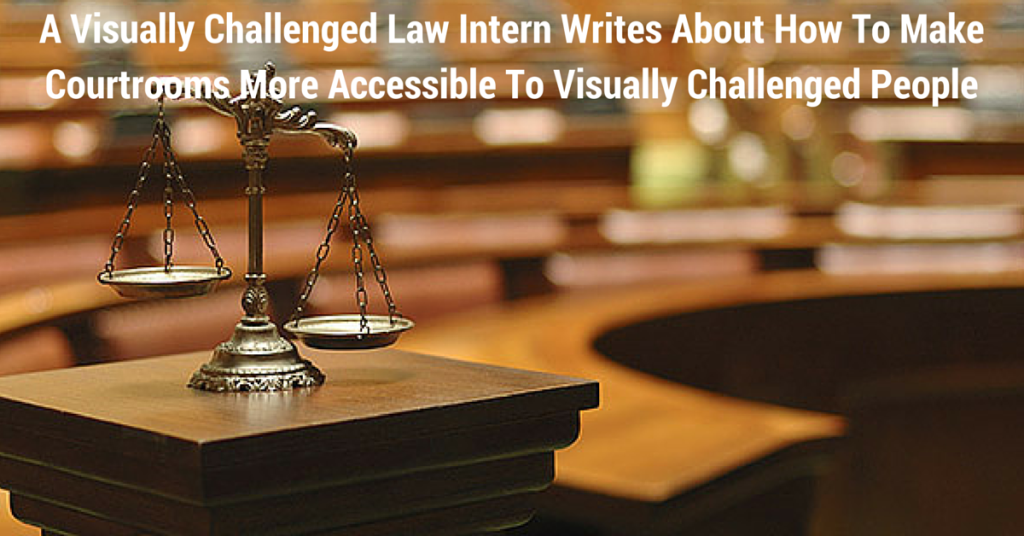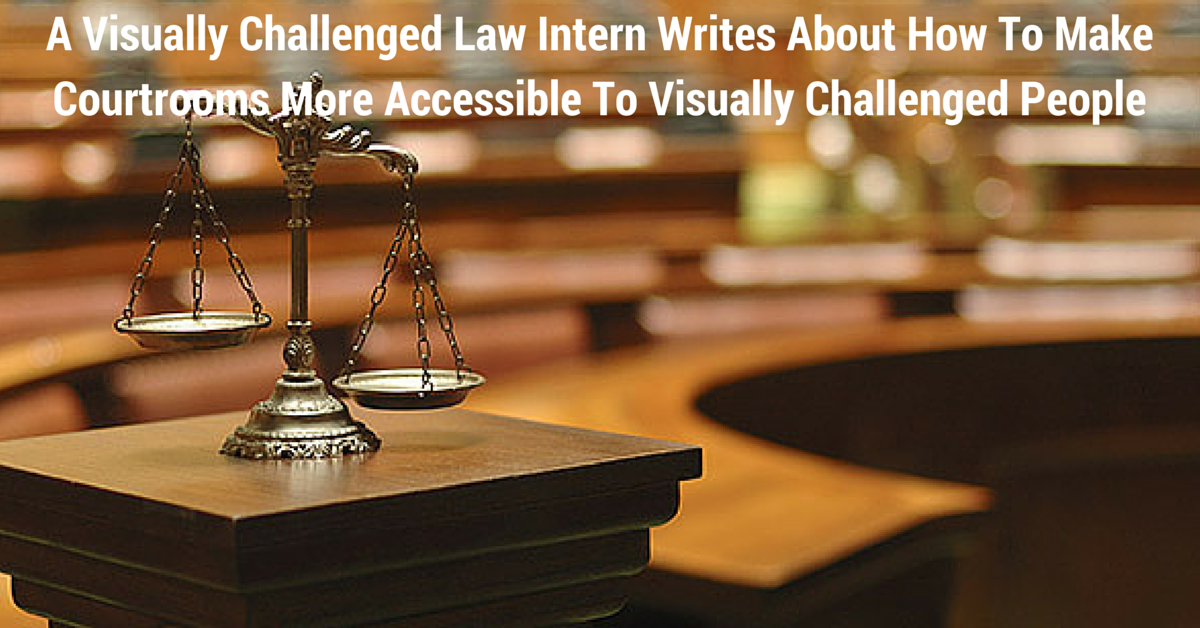This article has been brought back from the archives on popular demand. It was first published in now defunct A First Taste of Law. The author, Turab Chimthanawala, is a 3rd year student at Dr. Ambedkar College, Nagpur. He is visually challenged, but does not shy away from rigourous internships at district courts. He is currently interning with iPleaders. We asked him what changes should be made at courts to make them more accessible, and this is what he wrote. Read on, over to Turab.
Make COURTS ACCESSIBLE TO VISUALLY IMPAIRED
Visual impairment is a setback and such people are looked down upon as inferior to other so-called normal people. However such people if given the suitable environment and support, by using their other senses can rise above normal people.
This also applies to visually challenged lawyers and litigants.
Sadly the law courts and legal system in India has turned a blind eye to this fact. This calls for suitable modifications in the Law courts.
Modifications for Visually Challenged Lawyers
Accessibility:
The law courts should be heavily lighted with huge bulbs put up at every corner of the court building. All staircases and the entire structure of the court room should be fitted with neon light to enable better navigation in court room.
A system should be put into place where the impaired lawyers should be informed in advance about the approximate time of different cases in different courts, removing the hassle of repeatedly checking up the boards outside court rooms where things are written so faintly that it is difficult for sighted people. Such updates can be given by SMS. Devices can be set up at the court doors which speak the name of the court as soon as one enters.
Submission of documents:
For the sake of convenience visually handicapped lawyers should be allowed to file documents online.
Proceeding in court:
The martial and peons in courts should be more cooperative and helpful to impaired lawyers and assist them in all prospects instead of taking bribes from them and harassing them.
The impaired lawyers should have the freedom of using PPT while arguing cases especially in High courts and Supreme courts.
The cross examination process should be reformed and modified for visually challenged persons as such processes rely a great deal on facial expressions of the witness which are difficult for the impaired lawyers to comprehend. When the impaired lawyers are conducting cross examination the witness should be allowed to take the help of others .The judges should observe such cases more carefully.
For better output from impaired lawyers there is a need to educate others dealing with such lawyers so as communicate more through words then through actions and expressions.
Every court must have a Website where the lawyers can check the status of their case for e.g.: whether the defendant has filed a written statement. This would be of great benefit to visually challenged lawyers.
E-library:
For the benefit of impaired lawyers the libraries in courts should have e-learning facility and all computers should have soft wares like MAGIC and JAWS installed to help impaired lawyers.
Books especially Bare Acts should be available in Braille.
Modifications for visually challenged litigants
The court is temples of justice and easy and quick justice is the right of every citizen. Thus the courts need to be more sensitive towards needs of visually handicapped litigants.
Accessibility:
The courts need to be more lighted with neon lights put up on staircases and the entire structure of court room. Machines should be installed which speak aloud the name of the court and the judge as one enters the court. The outlay of the court building should be shown through an enlarged map on every floor. In some of the larger courts help desks should be present at the entrance.
Registration of cases:
The persons employed in courts should be more cooperative and sensitive towards the visually handicapped litigants while registering cases. If possible online filing should be introduced.
Notarisation:
The process of notarisation should be reformed where the impaired persons should be given access to an online process.
Proceedings in court:
Suitable amendments should be made in Evidence Act so as to enable blind litigants to give testimony without difficulty. The judges also should ensure that the atmosphere in the court is made suitable for visually impaired litigants.
Documentation:
Visually impaired persons should be permitted to draft documents like wills, gift deeds, agreement to sale etc. electronically and attest them using digital signature as this would lead to their independence and reduce chances of their being cheated.
Conclusion
Hence , by making such alterations in courts and changes in the legal system ,visually handicapped lawyers can bridge the gap and practice to the same extent as full sighted lawyers with utmost zeal and enthusiasm. Such changes would play a pivotal role to make such lawyers independent. It also will allow visually handicapped persons who although passionate about practicing law but apprehensive because of their handicap to do so, may take up law as a career.
As for the visually impaired litigants, such changes will allow them to realise the right to access courts and perform other legal transactions independently and without being duped. It will enable them to live in a democracy like normal citizens.
 Serato DJ Crack 2025Serato DJ PRO Crack
Serato DJ Crack 2025Serato DJ PRO Crack










 Allow notifications
Allow notifications


